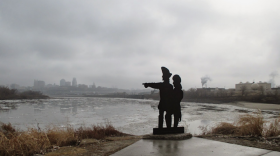Wasn’t it audacious to call the operation "the Corps of Discovery," as if these white guys were "discovering" anything? Was it arrogant of them to name things like rivers and creeks and mountain meadows?
But naming things is what Lewis and Clark often did. When they reached a big bend in the river up north of Kaw Point, they couldn't help but notice a tributary, 40 yards wide or so, Clark said. So they named it, as if no one in the history of humankind had ever seen it before.
You can call that arrogance, but a better name is what we might call "privilege."
But I can’t help it--I still really love their gushing about the beauty of the Missouri River, a beauty they “discovered,” not as if no one else had but as if they didn’t believe it themselves. Near Atchison, Kansas, Clark just gushed:
"We camped in... .one of the most beautiful places I ever Saw in my life, open and beautifully Diversified with hills & vallies all presenting themselves to the River."
When you’re used to it, it’s easy to look past the rich beauty of our natural world. They didn’t. A bit later he starts in again:
"The Plains of this countrey are covered with a Leek Green Grass, well calculated for the sweetest and most norushing hay—interspersed with Cops [copses] of trees, Spreding their lofty branchs over Pools Springs or Brooks of fine water. Groops of Shrubs covered with the most delicious froot is to be seen in every direction, and nature appears to have exerted herself to butify the Senery by the variety of flours delicately and highly flavered, raised above the Grass, which Strikes & profumes the Sensation, and amuses the mind."
All that beauty, Clark says, has a strange effect; it "throws it into Conjecterng the cause of So magnificent a Senerey. . . in a Country thus Situated." And then, watch for it, racism, white privilege. I don’t have any doubt you’ll pick it up because it’s unimaginable for William Clark to observe such breathtaking beauty and not wonder at the injustice of all that beauty in a land so "far removed from the Sivilised world to be enjoyed by nothing but the Buffalo Elk Deer & Bear in which it abounds & Savage Indians." Honestly, I adore their adoration for beauty along the river, but I can't be blind to the arrogance that underlies it. Brilliant, daring men as adept with a rifle as they were with their quills, held little regard for men and women other than themselves: "so much beauty able to be beheld only by animals and savages”--how on earth can that be?
I'd like to believe I can admire this enterprise and still see it generated by privilege. In 1804, there was no one at the confluence of Independence Creek and the Missouri--none, zero. Fifty years later, the place would be jumping, six thousand people, amid hundreds of other towns and villages. Soon enough, the swarm would be forming under a banner of "Manifest Destiny."
Tough questions really. If you think not, you’re wrong. We'll see what we can learn.








